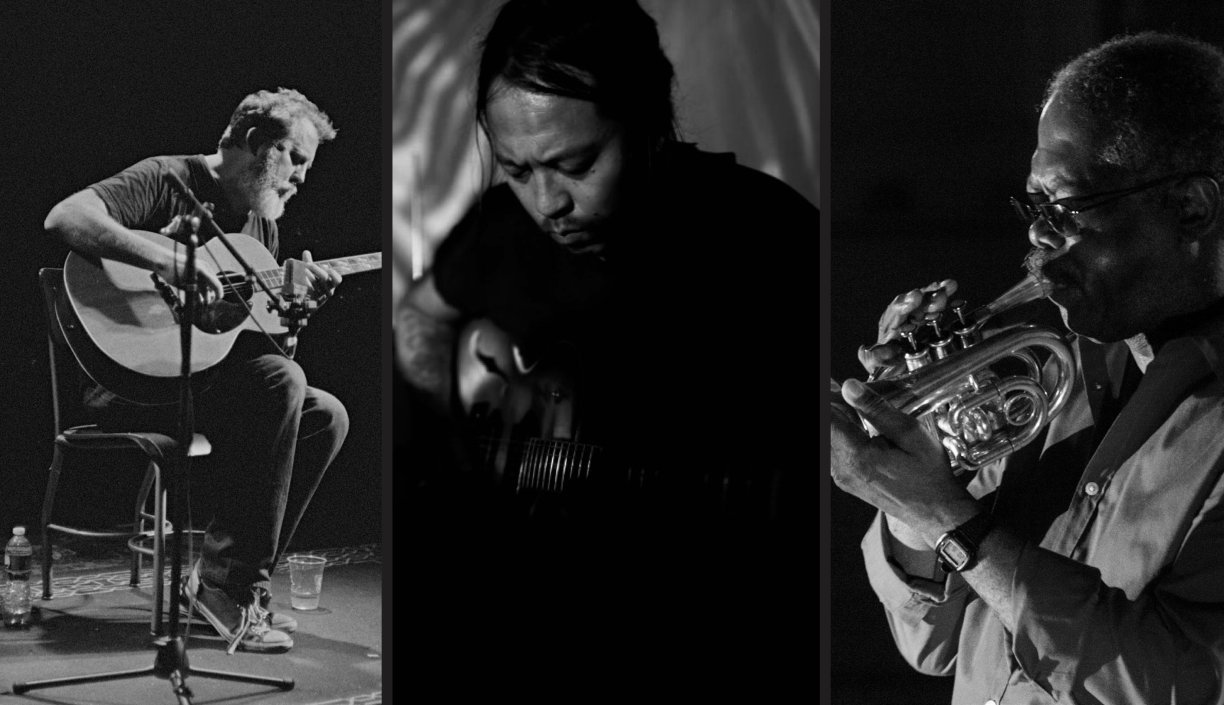Bill Orcutt & Tashi Dorji Duo
Thursday, June 7th, ISSUE presents an evening of improvisations between celebrated four-string guitarist Bill Orcutt, unbound Bhutanese guitarist Tashi Dorji, and Poughkeepsian creative jazz originary Joe McPhee. While all three musicians are tireless collaborative improvisers and iconoclast solo performers, each possesses an enduring aesthetic approach that’s as independent as it is profoundly empathic.
The evening features two duo sets (Orcutt & Dorji, McPhee & Dorji), culminating with the three coming together for a debut trio performance -- a combination that’s sure to yield unseen results. Here, Dorji’s fierceness is the consistent thread within each conversation, a discourse flowing between the mutually frenetic stylings of Orcutt and deeply intentional mediations of McPhee.
Bill Orcutt’s authorship of a highly disruptive version of “The Great American Songbook” fills chasms of negative historical space -- with flows of fragmented notes revising, interpolating, and critiquing the form. Here, Orcutt expands the ruptures of songcraft, breaking each melody into infinitesimal pieces, coding each part into new narratives. Marked by an inimitable, sputtering style, Orcutt’s prophetic stature in American guitar music is indisputable given his constant re-discovery of the vibrancy of “rotten” historical materials -- either in guitar song, or in noise during years prior in Harry Pussy. In the words of critic Matthew Philips, “he brings these pieces of history out from the invisibility where they had festered ever since their last audition.”
Tashi Dorji’s own omnivorous skewering of guitar traditions has developed a highly idiosyncratic take on on the instrument, one defined by his non-stop movement and profound openness to technique. Although much as been said about his parallelisms with the stark improvisational world of Derek Bailey and meditative energy of Ben Chasny, Dorji has reached the point where his hybrid style has amalgamated into a new form altogether. Although his lawless approach can often express itself fiercely, with roots in the more savage strands of avant-jazz or free folk, his playing can quickly deviate to impressionistic, emotive gesturing -- harmonizing between quiet chord-sustain and knobby, quick passages.
As one of experimental music's most influential guitarists, Bill Orcutt weaves looping melodic lines and angular attack into a dense, fissured landscape of American primitivism, outsider jazz, and a stripped-down re-envisioning of the possibilities of the guitar. Whether he’s playing his decrepit Kay acoustic or gutted electric Telecaster (both stripped of two of their strings, as has been Orcutt’s custom since 1985), Orcutt’s jagged sound is utterly unique and instantly recognizable, compared with equal frequency to avant-garde composers and rural bluesmen. Orcutt originally appeared on the underground scene as a co-founder of Harry Pussy, whose explosive music combined ‘70s no wave, the ferocity of ‘80s hardcore, and the acrobatic intricacy of Cecil Taylor. Seemingly single-handedly, and over the course of dozens of releases, Harry Pussy built the prototype for noise-rock in the ‘90s and beyond. Throughout, Orcutt (aided occasionally by a second guitarist) wove incandescent, treble-heavy lines through the maelstrom of Adris Hoyos’ percussion. They toured extensively, performing or traveling with bands like Sonic Youth, Sebadoh, The Dead C, and Guided by Voices, before screeching to a halt in 1997. Writing about a 2008 compilation of their work, Pitchfork described Harry Pussy as "just about the most abrasive band America has ever seen." After a hiatus of over a decade, Orcutt reemerged as a solo artist, at first performing solely on acoustic guitar. Drawing influences from Cecil Taylor (again), Dylan’s Basement Tapes, and the recursive voice of Gertrude Stein, Orcutt began exploring the invisible threads linking free improvisation to the forgotten crevices of the American songbook, from blues to minstrelsy. His newest work continues the guitarist's signature interrogation of his instrument, yet signals a new phase of cautiously-employed conventional melody and song structure. With each recording and performance, Bill Orcutt continues to invent a sonic vernacular built around raw and tortured tones, ragged minimalism, and seemingly inexhaustible improvisational stamina.
Tashi Dorji grew up in Bhutan, on the eastern side of the Himalayas. Residing in Asheville since 2000 and soaking up a vast array of music. Along the way, Dorji developed a playing style unbound by tradition, yet with a direct line to intuitive artistry. His recordings feature improvisations that spasmodically grow along tangential, surprising paths. All references break loose during a composition, as Dorji keys into his own inner world. His compositions drag the listener into a labyrinth of warbling tones, where each sound seems to jump out and replace the eerie silence that would otherwise occupy the atmosphere. The textures remain sustained in the reverberation as the vibration of the strings dwindle and ascend. After a handful of releases on various labels since 2009, Dorji presented his debut LP on Hermit Hut, the label created by Ben Chasny (Six Organs of Admittance) in 2014. And since Tashi has released music both as a soloist, and with duo projects, notably with percussionist Tyler Damon and MANAS (w/ Thom Nguyen) on labels like Bathetic Records, Cabin Floor Esoterica, Blue Tapes, Marmara Records, Feeding Tubes, UNROCK, VDSQ, MIE, Ultra Violet Light, Family Vineyard and Astral Spirits.
Videography by Yiyang Cao. Audio mixed by James Emrick. Edited by Wyatt Owens.

